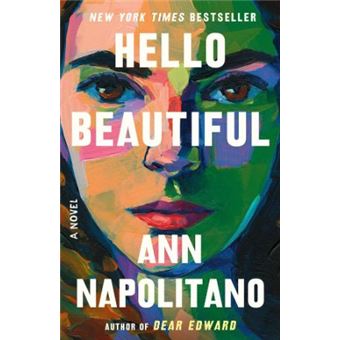
Present: Evette, Jennifer, Mariannick, Caroline F-R, Sealia, Denise, Susan Ardito, Barbara, Beth, Katharine C, Betsy. Regrets from Wendy Harding and Rosie.
The meeting was led by Evette.
Evette introduced the author, Ann Napolitano. Born in 1971, she attended college in CT, and earned an MFA degree from NYU. A major event in her life was contracting Epstein-Barr virus at the age of 20, which took her out of the circulation and social life of college. Hello Beautiful was written during the pandemic, and she found the most fun in immersing herself in the life of the four sisters of the book. Napolitano felt lonely (as did the character in the book, William) and she felt nourished by the tale of William and the four sisters, and found that the book created personal social fulfillment. She has expressed that her book being chosen by Oprah Winfrey, as the 100th book in Oprah’s book recommendations, was an unbelievable honour (as well as a prodigious boost to its sales).
Summary of our discussion: the book made a compelling start, particularly with respect to the characterisation of William, but lost steam when the focus turned towards Julia, and her three sisters, (whose characters were less expanded) and the tale became predictable towards the end. The character Julia received a very poor response from the group.
Evette had prepared a number of questions for the group to discuss, the first being “Who is the main character in the book? There were several views on this, including:
- The person who is telling the story in each specific chapter (William, Julia and Sylvia)
- William is not the main character, he’s the catalyst
- The main character is the group of four sisters
- The father of the sisters, Charlie, who gave the title to the book
A discussion of Charlie included the fact that he was widely viewed with love and respect outside his family, but not by his wife Rose; within his family he was regarded affectionately as a loser. Susan offered that Charlie was similar to William, that Rose, his wife, wanted him to be different, just as Julia wanted William’s character to be different. Where they differed was that although Charlie did not meet his wife’s expectations, he remained true to himself. Julia had a parallel experience with William - he didn’t fulfil her expectations, even though he did try to be the man Julia wished him to be. After William’s childhood trauma - unloved, his parents disengaged from him after the death of William’s sister, he had no personal life and no fulfillment except through basketball. But Sylvie loved him for who he was, she saw his inner self, and responded to it by falling deeply in love with him; Charlie saw the man that William was; Julia did not.
We discussed why William’s parents disengaged from him so severely, and considered that it was the death of his sister, Catherine, coupled with the fact that grief affects people very differently, and that grief can run into depression.
The subject of Little Women, and whether the similarities with that book resonated with our group was discussed briefly, including who among the four sisters is comparable to the March sisters? (And it was felt that the comparison wasn’t germane).
The whole framework, and tenet of the book, is about the so-called betrayal of Sylvie and William - but most of us agreed that Julia chose the path of victimhood, moving away to New York, which suited her life and career plans. (She was, after all, divorced when her sister and her ex-husband got together) and she hung on to her grievance for 27 years and only reconnected with her family on the death of her sister, Sylvie. Julie seemed happy to be “betrayed”, and her indignation permitted her to be the “rocket” in life as termed by Charlie, her father. Sealia, in particular, was outraged by Julia’s resentment, stating that Julia used the excuse of being slighted to stay away from her family.
Caroline made the observation that every person has an inner and outer self, and that we notice a lack of balance when the outside becomes more important (as with Julia, being the honor student, the rocket to success) than the inside.
Sylvie, Julia’s sister and William’s second wife, is a carer, and when dying, she cares more about how William is enduring her illness than about herself.
But it was clear to the group that the rift is between Julia and her three sisters - the rest of the family stays intact. Julia is the outlier; the mother, Rose, absents herself by moving to Florida.
There is a strong theme of forgiveness amongst the sisters; Cecelia goes to the airport (to meet her mother), because to her, forgiveness is love, and she lets go of the pettiness and hurt in order to retrieve the relationship with her mother. (But we don’t know how much forgiveness the mother, Rose, has in her; she is not a sympathetic character.)
We discussed which relationships in the book work, and listed them out. When we discussed Kent and Nicole (two doctors, with stressful lives, whose divorce is summarily announced), Pat pointed out that this was a convenient plot point - Sylvie dies and William is supported by his best friend Kent.
Caroline felt let down by seeing so much of William's character being revealed at the beginning, and then the focus shifted to Julia and her actions (some of which met with our disapproval, e.g. telling their 5-year old daughter Alice that her father had died).
Barbara pointed out that the timeline was the 80s but felt like the 50s. (And Rose the mother was from the 19th century…..)
Pat commented that she saw the author’s disapproval of Julia, the successful woman, leaving her family behind in Chicago - and wondered if the author realised that was how she would be perceived?
When someone said Julia is a great mother, a response of “Well, maybe, BUT she's controlling” was forthcoming. Betsy noted that Julia was nervous that if her daughter Alice was exposed to the family in Chicago, she would opt to be with them, and not her. Julia seemed happy with the labels of “wife; single mother”, and Caroline noted that Julia didn’t accept that she had failed at her marriage, and consequently didn’t move on. Everyone else did.
Pat felt that while the book was a good story, it was overly contrived.
We discussed the ending: what will happen to William and his newly-met daughter, Alice? Betsy felt that the story ended on a positive note, and Sealia believed that the ending proved that William was the main character, because at last, he knows who he is, and that it’s acceptable to be liked and lovable. Caroline noted that basketball was the only way for William to have felt alive when he was younger; and, he learned to live with his injured body, to accept this, and to use his life to help younger basketball players who may need help to support their body, and their dreams of basketball success. William used his knowledge to watch these players and to guide them when they needed help; Evette really respected that ability of his.
One of us pointed out that Julia was regarded as the problem-solver - but in fact, it is William who manages that role so well. While a minor character, Kent is a true friend to William, he always has his back. And a hurrah for the men, the team of basketball players who sought William after he disappeared, and supported him through his grief at the loss of his wife. The relationship amongst the group of men was stellar.
Among the other minor characters, we noted that Emmeline hid her inner life from her family.
Pat wondered whether Alice had an issue with her height (>6foot), although she seemed to have her life together.
We noted the change in parenting styles between Cecelia’s style (no b.s., no secrets) and those of previous generations (Julia’s; Rose’s).
We wondered if friendship is what happens outside the family, and is non-judgmental. Sealia spoke about the concept of a “chosen family” from within the friendship circle - a familiar concept to most of us present who are expats. Time didn't allow for an extended discussion about one’s formative years with one’s siblings, and about being the first-born or second-born.
In sum, Evette sent Rosie’s regrets, who said she had enjoyed the book, and cited an example of beautiful writing: that Sylvia’s curly hair acted as though it had its own plans for the day.
Evette asked for our ratings (on a scale of 1 to 10) of the book, and these ranged from 4 to 8+.
The most positive comments included Sealia’s, who kept reading to find out how people could make their lives work better; she was greatly affected by Sylvia’s death. Pat felt it was too long, repetitive and should have had a better edit.
Caroline felt that the book had good psychological insight, which made her enthusiastic at the beginning, but bored by the end. Evette corroborated that sentiment. FIN.

